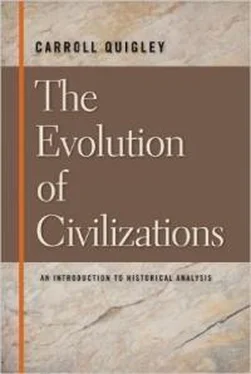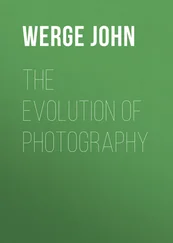I deeply appreciate the efforts of Professor Quigley's widow, Mrs. Lillian Quigley, a fine scholar and writer in her own right, to make available to me her husband's work relating to the philosophy of history, the sociology of weaponry, and its influence on civilization. To borrow a phrase from Quigley's title, Tragedy and Hope, his death was a tragedy which deprived us of the full measure of his brilliant analyses about the development of civilizations. My examination of his papers also suggests hope, for he left in manuscript a vast addenda to what he had earlier begun. I am certain a great deal of this material will eventually find its way into print, but The Evolution of Civilizations is the indispensable first step toward understanding Quigley's interpretation of human action and history.
Books
The Evolution of Civilizations. New York: Macmillan, 1961; Indianapolis: Liberty Press, 1979.
La Evolucion de las Civilizaciones. Mexico City: Hermes, 1963.
A Evolucao das Civilazacoes. Rio de Janeiro: Editora Fundo de Cultura, 1963.
See the reviews of the English edition in the American Historical Review 67 (July 1962):987; Christian Science Monitor, January 8, 1962; Kirkus Review, September 1, 1961, p. 838; Library Journal, November 1, 1961, p. 3788; School and Society, October 6, 1962, p. 321; and Social Education 26 (April 1962) :219.
Tragedy and Hope: The World in Our Time. New York: Macmillan, 1965.
The World Since 1939. New York: Collier Books, 1968.
A reprint of the last half of Tragedy and Hope.
Among the reviews are: American Historical Review 72 (October 1966): 123; Annals of the American Academy 368 (November 1966):244; Best Sellers, February 15, 1966, p. 434; Book Week, January 16, 1966; Choice 3 (June 1966) :348; Library Journal, August 1965, p. 3284; New York Times Book Review, January 23, 1966, and Quigley's reply to same, with the reviewer's rejoinder, in the February 20, 1966, issue; Saturday Review, February 12, 1966, p. 34; and Virginia Quarterly Review 42 (Spring 1966):301.
Articles
"Falsification as a Source in Risorgimento History." Journal of Modern History 20 (September 1948):223-26.
"The Origin and Diffusion of Oculi." American Neptune, July 1955; and rejoinder in ibid., January 1958.
"Aboriginal Fish Poisons and the Diffusion Problem." American Anthropologist 58 (June 1956) :508-25.
"Comparative Cultural Developments." The Community Development Review (December 1957).
"French West Africa." Current History 34 (February 1958): 91-98.
"Education in Overseas France." Current History 35 (August 1958): 102-11.
"The French Community and Western Security." Current History 39 (August 1960): 101-7.
"French Tropical Africa: Today and Tomorrow." Current History 40 (February 1961):77-87.
"Belgium"; "France"; "Italy"; "North Atlantic Treaty Organization"; and "The Netherlands." In Funk and Wag-nails, New International Yearbook. New York: Funk and Wagnalls, 1961, 1963.
"The Round Table Groups in Canada, 1908-1938." The Canadian Historical Review 43 (September 1962) :204-24.
"The Brazzaville Twelve." Current History 43 (December 1962):346-53.
"Weapons Control as Seen from Abroad." Current History 46 (June 1964).
"The Creative Writer Today." Catholic World 206 (December 1967):111-17.
"France and the United States in World Politics." Current History 54 (March 1968): 151-59.
"Needed: A Revolution in Thinking." National Education Association Journal 57 (May 1968): 8-10.
"Lord Balfour's Personal Position on the Balfour Declaration (ed.). Middle East Journal 22 (Summer 1968): 340-45.
"Major Problems of Foreign Policy." Current History 55 (October 1968): 199-206.
"Our Ecological Crisis." Current History 59 (July 1970): 1-12.
"Youth's Heroes Have No Halos." Today's Education 36 (April 1971):46-48.
"Assumption and Inference on Human Origins." Current Anthropology 12 (October-December 1971):519-40; and discussion in ibid. 14 (October 1973) :499-502. "General Crises in Civilizations." American Association for the Advancement of Science news release, 1972.
"Cognitive Factors in the Evolution of Civilizations." Main Currents in Modern Thought 29 (November—December 1972):69-75.
"The Search for a Solution to the World Crisis." Futurist 9 (March 1975): 38-41.
"America's Future in Energy." Current History 69 (July 1975):1-5.
"Public Authority and the State in the Western Tradition: A Thousand Years of Growth, 976-1976." The Oscar Iden Lectures. Washington: School of Foreign Service, Georgetown University, 1977.
Notes
1. Expansion
The period of expansion of Canaanite society began as the withdrawal of Egyptian and Hittite influence and the absorption of Hurrian and Mitanni peoples allowed this new commercial society to emerge. At that time, we find a threefold situation: the Canaanite pagans in control of the south-
2. Mixture
The period of mixture of Classical civilization covers the Iron Age invasions which destroyed Cretan civilization and
3. Universal Empire
The Universal Empire of Classical civilization was achieved with the establishment of the political supremacy
4. Decay
By A.D. 200 Classical civilization had reached its period of decay. With the end of continual warfare and the clear inability of Rome's military forces to extend its frontiers further, the supply of both slaves and booty ceased. The unfavorable balance of payments of Italy became more acute. Trade began to decrease sharply, and a tendency for each province, even each large estate, to move toward economic self-sufficiency began. There was a return to grain growing in Italy. Craft activities began to move from the towns to the estates. The towns themselves ceased to grow, and later declined. The decreasing supply of slaves and the exodus of free persons from the town to the countryside gradually brought about an agrarian reorganization in which the landlords began to work their estates with tenants,
5. Expansion
The first stage of expansion in Western civilization lasted for about three centuries (970-1270) and was one of the greatest of such periods in human history. Its instrument of expansion was the feudal system in which a small minority
6. Conflict
The old view of our grandfathers that the Middle Ages was a static and backward era is now accepted by almost
7. Third Age of Expansion
The third Age of Expansion lasted from about 1730 to about 1929, although indications of a new Age of Conflict began to appear as early as 1890. Its instrument of expansion remained capitalistic, but operating in fields other than those that had become institutionalized in the earlier Age of Conflict of the late seventeenth century. The reappearance of expansion clearly resulted from circumvention of this previous organization. Again the period of expansion can be divided into substages that make the process of expansion.










